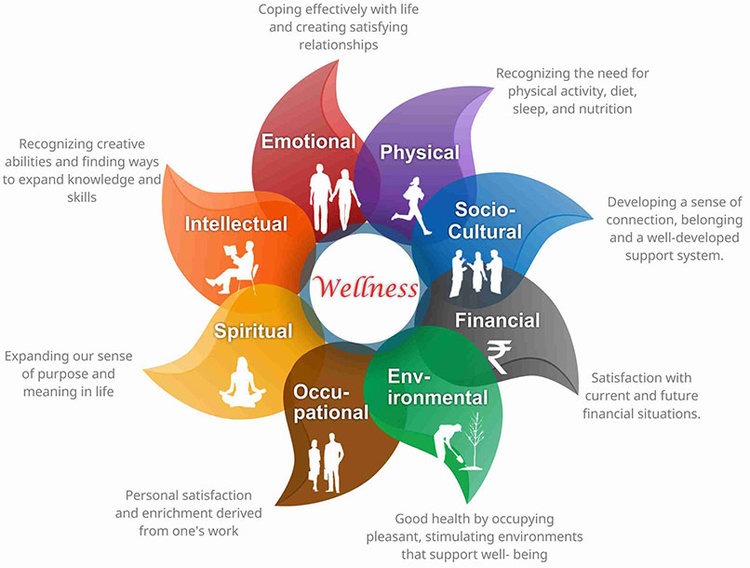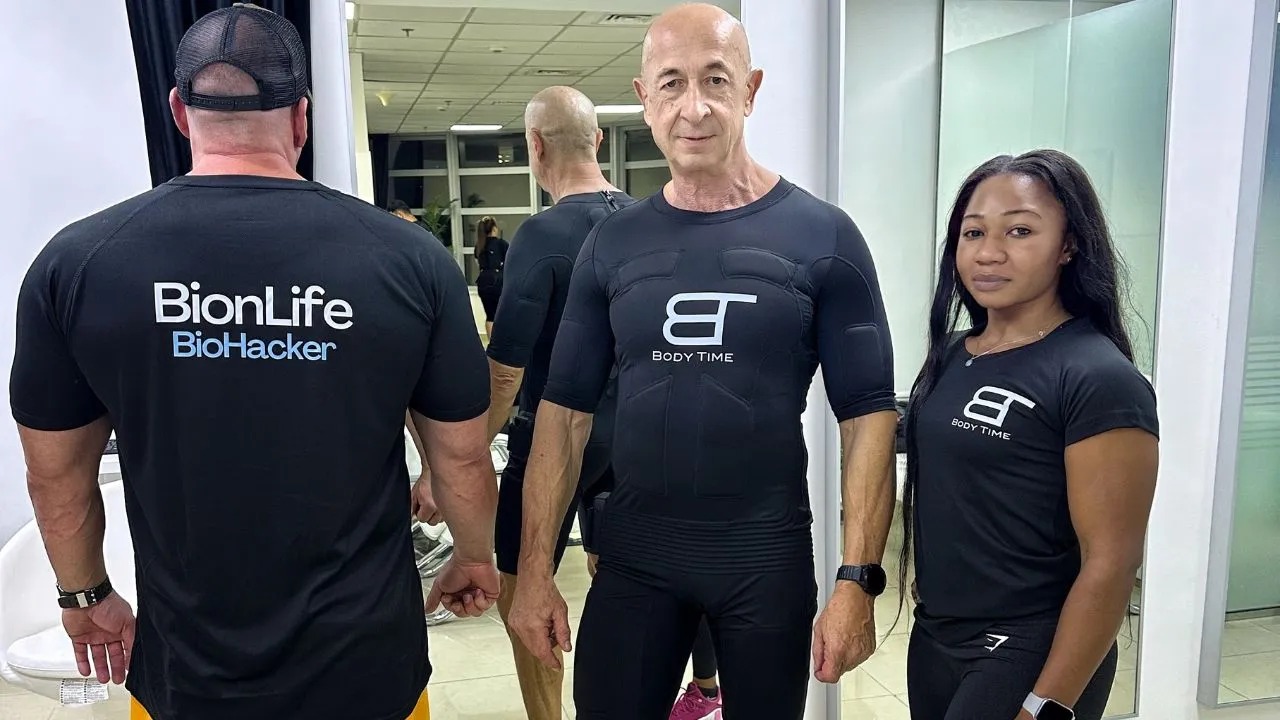
Well + Good – Trend-focused editorial on fitness, mental health, nutrition from a holistic wellness perspective.
Well + Good is a trend-focused wellness platform that redefines health by blending fitness, mental well-being, nutrition, and lifestyle into a holistic approach. Founded in 2010, it offers expert-backed, culturally relevant insights, highlighting emerging trends and inclusive practices. More than a publication, it has become a movement shaping modern wellness culture worldwide.
💪 Fitness Guru
54 min read · 29, Aug 2025

Well + Good – Trend-Focused Editorial on Fitness, Mental Health, and Nutrition from a Holistic Wellness Perspective
In today’s rapidly evolving world of wellness, health is no longer limited to diet charts, weight loss regimens, or rigid exercise schedules. Instead, it has become a multidimensional lifestyle that blends physical fitness, emotional well-being, mental health, nutrition, and even social awareness into one holistic approach. One of the pioneers leading this modern health movement is Well + Good, a digital media platform that has positioned itself as a trend-focused editorial hub, offering content at the intersection of wellness, culture, and lifestyle. By catering to a community of health-conscious individuals, Well + Good goes far beyond basic fitness advice, delivering insights on emerging wellness trends, scientific research, holistic practices, and modern self-care solutions.
This article explores the brand’s origin, editorial approach, coverage on fitness, mental health, and nutrition, and how Well + Good has successfully influenced modern wellness culture. It also looks into the broader significance of its work, the trends it highlights, and the way it addresses health from a holistic perspective.
The Origins and Mission of Well + Good
Founded in 2010 by former journalists Alexia Brue and Melisse Gelula, Well + Good started as a health-conscious editorial platform aimed at bringing clarity to the complex and often confusing wellness industry. At that time, “wellness” was either narrowly defined by restrictive diets and fitness fads, or else dismissed as a niche interest. Brue and Gelula recognized the need for a credible platform that could bridge the gap between science-backed advice, lifestyle trends, and the growing desire among people to live healthier, more mindful lives.
The mission of Well + Good was simple yet revolutionary: to create a trustworthy space for readers where fitness, nutrition, and mental health are not isolated pillars, but interwoven aspects of overall well-being. Over the years, the publication has become one of the most recognized wellness platforms globally, covering not just the basics of health but also cultural and societal conversations surrounding wellness, sustainability, inclusivity, and the future of self-care.
A Trend-Focused Editorial Approach
Unlike traditional health publications that stick to medical advice or generic workout tips, Well + Good embraces a trend-focused approach. Its editors and contributors identify new developments in wellness culture, often before they hit the mainstream. This forward-thinking perspective has allowed the platform to become a thought leader in areas such as:
- Holistic Fitness: Going beyond gym workouts to include yoga, Pilates, dance-based exercises, outdoor fitness, and mindful movement.
- Mental Wellness: Addressing therapy, meditation, mindfulness practices, and the importance of balancing productivity with rest.
- Nutrition and Food Trends: Highlighting functional foods, plant-based diets, supplements, gut health, and the psychology of eating.
- Lifestyle and Social Health: Covering sleep hygiene, workplace wellness, sustainable living, digital detox, and beauty as part of overall well-being.
By merging cultural relevance with expert-backed advice, Well + Good ensures that its content resonates with both casual wellness seekers and dedicated health professionals.
Fitness Coverage: From Workouts to Mindful Movement
One of the core pillars of Well + Good is fitness. However, the platform distinguishes itself by not reducing fitness to repetitive workout plans or calorie-burning exercises. Instead, it explores the connection between movement, mental clarity, community building, and long-term health.
Key Features of Fitness Content on Well + Good:
- Innovative Workouts: From barre to HIIT, Well + Good covers new and emerging workout trends, often giving readers an early introduction to what might become mainstream later.
- Movement for Mental Health: Articles frequently discuss how exercise can be used as a tool to relieve stress, boost mood, and enhance cognitive function.
- Inclusivity in Fitness: The editorial emphasizes accessibility, celebrating fitness for all body types, ages, and abilities.
- Fitness Tech: Well + Good explores how wearable tech, apps, and digital platforms are reshaping the way people approach workouts.
This broader perspective reframes exercise not as a punishment for indulgence but as a joyful, restorative practice that enhances multiple aspects of life.
Mental Health: Normalizing Conversations and Self-Care
A defining feature of Well + Good is its proactive engagement with mental health. In an era where conversations about stress, anxiety, burnout, and therapy were once taboo, the platform has helped normalize these discussions by treating mental health with the same importance as physical fitness.
Key Themes in Mental Health Content:
- Therapy as Mainstream: Well + Good explores different forms of therapy, from cognitive behavioral therapy to art and music therapy, and encourages openness about seeking help.
- Mindfulness Practices: Meditation, journaling, yoga nidra, and breathing exercises are presented as approachable tools for everyday life.
- Work-Life Balance: The platform often highlights the dangers of hustle culture and promotes rest, recovery, and boundaries as vital to mental well-being.
- Digital Health: Recognizing the impact of technology, Well + Good discusses strategies for managing screen time, social media fatigue, and digital detox.
By creating relatable, stigma-free content, Well + Good has made mental health part of everyday wellness rather than a hidden struggle.
Nutrition: Beyond Diets to Holistic Eating
Well + Good’s nutrition coverage stands out because it doesn’t simply promote diets or calorie restriction. Instead, it provides a holistic approach that considers food as nourishment for the body, mind, and soul.
Elements of Nutrition Content:
- Functional Foods: Coverage of foods that improve specific areas of health, such as turmeric for inflammation or probiotics for gut health.
- Food Psychology: Understanding emotional eating, mindful eating, and the role of food in social connection.
- Diet Diversity: Exploring plant-based eating, sustainable diets, and cultural approaches to food without judgment.
- Supplement Insights: Breaking down the science and myths surrounding supplements, vitamins, and herbal remedies.
By blending nutritional science with lifestyle perspectives, Well + Good empowers readers to make informed food choices without falling into harmful diet culture traps.
A Holistic Wellness Perspective
What makes Well + Good unique is its ability to look at wellness as a whole rather than in isolated categories. The publication emphasizes that true well-being involves harmony between physical fitness, emotional balance, mental resilience, and nutritional awareness. Some of its broader holistic themes include:
- Sleep Health as a Foundation of Wellness
- Sustainability and Eco-Wellness Practices
- Beauty as a Form of Self-Care, Not Just Vanity
- Community and Social Belonging as Key to Health
This comprehensive approach ensures that readers don’t just pick one aspect of health to focus on, but instead learn to integrate multiple elements into their everyday lives.
Impact on Modern Wellness Culture
Well + Good has significantly influenced how people think about health today. It has shaped conversations around inclusivity in fitness, normalized therapy, brought attention to sustainable living, and encouraged a balanced approach to nutrition. By blending scientific expertise with cultural trends, the platform has created a blueprint for modern wellness media.
Well + Good is one of the most influential and trend-focused editorial platforms in the wellness industry, dedicated to exploring fitness, mental health, nutrition, and lifestyle through a holistic perspective that redefines what it means to live well in the modern age, and unlike traditional health magazines that often limit themselves to rigid workout schedules, calorie counting, or one-size-fits-all diets, Well + Good weaves together the many dimensions of wellness—physical, emotional, psychological, nutritional, and even cultural—into a dynamic narrative that speaks to today’s health-conscious generation, positioning itself not merely as a media outlet but as a movement that has shaped how wellness is perceived and practiced over the last decade; founded in 2010 by journalists Alexia Brue and Melisse Gelula, the platform emerged at a time when wellness was either reduced to fad diets or dismissed as a luxury for the elite, yet the founders recognized that people were searching for clarity, credible information, and inspiration in a world oversaturated with conflicting advice, and thus their mission was to create an inclusive and forward-thinking editorial hub that could highlight trends, break down science-backed insights, and contextualize health in everyday life, giving rise to a community that treats wellness not as a goal but as an ongoing lifestyle journey; central to Well + Good’s success is its trend-focused editorial lens, which allows it to anticipate and spotlight wellness developments before they become mainstream, whether it’s new fitness approaches like barre, Pilates hybrids, or mindful movement practices that emphasize joy over punishment, or mental health conversations that normalize therapy, meditation, and digital detox as essential parts of daily living, or nutrition stories that move away from restriction and diet culture and instead focus on functional foods, mindful eating, and the psychology of nourishment, and this blend of foresight and relatability has earned the platform a reputation as a thought leader in wellness culture, attracting not only everyday readers but also professionals who look to it for guidance on emerging topics; when it comes to fitness, Well + Good distinguishes itself by exploring movement in its broadest sense, reframing exercise as a restorative and empowering practice rather than a way to burn calories, with coverage spanning innovative workouts, the role of exercise in mental clarity, the use of technology like fitness apps and wearables, and the celebration of inclusivity in movement by showcasing fitness options for all body types, abilities, and ages, thereby creating an environment where physical activity is accessible and joyful rather than intimidating or exclusionary; equally important is its approach to mental health, where Well + Good has played a vital role in destigmatizing discussions about anxiety, burnout, therapy, and mindfulness, encouraging readers to see mental health as an integral part of overall wellness rather than a hidden or taboo topic, and the platform does this by offering approachable content on practices like meditation, journaling, yoga nidra, breathing exercises, and work-life balance, while also addressing modern challenges like screen fatigue, social media overload, and the need for boundaries in hustle culture, presenting rest and recovery not as laziness but as essential for resilience and productivity; in nutrition, Well + Good’s holistic perspective breaks away from the obsession with diet labels and calorie counting, instead highlighting food as a tool for healing, energy, and social connection, with coverage that ranges from functional foods like turmeric and probiotics to the psychology of emotional eating, the importance of mindful eating, plant-based diets, sustainable food practices, and the science behind supplements and herbal remedies, all presented in a way that empowers readers to make informed choices without falling prey to diet culture or nutritional myths, and this balanced view allows food to be seen as a source of nourishment for both body and mind; what sets Well + Good apart overall is its holistic vision of wellness, emphasizing that true health is achieved through harmony between physical fitness, emotional well-being, mental clarity, and nutritional balance, while also extending its coverage to lifestyle dimensions like sleep hygiene, sustainable living, eco-conscious beauty, workplace wellness, and even the role of community and belonging in health, thereby painting a picture of wellness as interconnected rather than fragmented; this comprehensive editorial style has had a measurable impact on modern wellness culture by shaping conversations around inclusivity in fitness, normalizing therapy and mental health awareness, encouraging mindful nutrition, and broadening the definition of wellness to include sustainability and social consciousness, ultimately helping millions of readers embrace a lifestyle that is both aspirational and practical; in conclusion, Well + Good is far more than a wellness website—it is a cultural force that has redefined how individuals and communities approach well-being in the 21st century, and through its trend-focused, science-informed, and holistically balanced editorial approach, it continues to inspire people to see wellness not as a destination but as an evolving journey of balance, resilience, and self-care.
Well + Good is widely recognized as one of the most influential editorial platforms in the global wellness industry, serving as a trend-focused voice that covers fitness, mental health, nutrition, lifestyle, and cultural shifts through a holistic lens that resonates deeply with modern audiences who no longer see health as a singular pursuit but as a multidimensional journey of balance, growth, and self-care, and since its founding in 2010 by journalists Alexia Brue and Melisse Gelula, the platform has expanded from being a small digital publication to a movement that has shaped the very language of wellness, responding to the growing desire among individuals to find credible, science-informed, yet culturally relevant advice on how to live better; unlike older health magazines that often framed wellness as a matter of strict diets, calorie-counting, rigid gym workouts, or beauty ideals, Well + Good positioned itself as a progressive voice that emphasizes accessibility, inclusivity, and emotional intelligence, embracing not just the “how” of wellness but also the “why,” which is why it reports not only on physical health but also on mental resilience, emotional well-being, sustainability, social connection, and even the influence of technology on our daily lives, making it a hub that blends expert insight with real-world trends; its editorial strategy is deeply trend-focused, meaning the team identifies emerging wellness movements long before they hit the mainstream, whether it’s spotlighting kombucha and gut health before they became grocery-store staples, recognizing meditation apps and digital mindfulness tools before they exploded into billion-dollar industries, or highlighting the role of inclusivity and diversity in fitness culture at a time when the industry was still dominated by narrow body ideals, and this forward-looking perspective has allowed the platform to earn trust not only from readers but also from industry professionals who recognize Well + Good as a barometer of what’s next in wellness; in terms of fitness coverage, the site moves away from the outdated narrative of exercise as punishment or a weight-loss tactic and instead promotes movement as a joyful, restorative, and mentally uplifting activity, with in-depth explorations of practices like yoga, Pilates, barre, functional training, and outdoor exercise, while also covering new modalities, tech-driven innovations, and the science of recovery, all framed with an emphasis on inclusivity so that people of all ages, body types, and abilities can feel welcome in fitness spaces, and this narrative shift has been instrumental in changing the cultural view of exercise from something intimidating to something empowering; mental health is another major pillar of Well + Good, and here the platform has played a pioneering role in normalizing conversations that were once stigmatized, treating therapy, stress management, and emotional awareness with the same importance as workouts or diet, and it does so by presenting accessible tools like meditation, journaling, breathwork, yoga nidra, and mindfulness practices alongside expert-backed insights into more clinical approaches like cognitive behavioral therapy, while also addressing the challenges of modern living such as workplace burnout, hustle culture, screen fatigue, and social media overload, all with a tone that is approachable, stigma-free, and deeply supportive, which makes readers feel less isolated in their struggles; in the realm of nutrition, Well + Good stands out for resisting the traps of diet culture and restrictive eating plans, instead presenting food as a source of healing, energy, connection, and joy, with coverage that includes functional foods like turmeric, probiotics, and adaptogens, the science of gut health, the psychology of emotional eating, and explorations of mindful eating practices that encourage people to listen to their bodies, alongside balanced reporting on plant-based diets, cultural food practices, sustainable sourcing, and the role of supplements and herbal remedies, and by weaving together nutritional science with lifestyle considerations, the platform helps readers make informed, flexible, and compassionate food choices without guilt or fear, making nutrition a tool for empowerment rather than restriction; beyond fitness, mental health, and food, Well + Good takes a holistic view of wellness, treating sleep hygiene, sustainable living, eco-conscious beauty, social belonging, and even community wellness as integral to health, because true well-being is not achieved through one-dimensional fixes but through harmony across all areas of life, and its content reflects this by highlighting everything from the importance of circadian rhythm to the benefits of digital detox, from sustainable fashion to eco-friendly home products, and from self-care rituals to the larger societal context of health inequities and accessibility, showing readers that wellness is personal but also collective, both an individual practice and a cultural movement; this comprehensive approach has allowed Well + Good to influence modern wellness culture in profound ways, shaping the discourse around inclusivity in fitness, sustainability in nutrition, accessibility in mental health care, and the redefinition of self-care as something more than bubble baths and candles—it is about resilience, rest, boundaries, community, and conscious choices that sustain long-term well-being, and this shift has been particularly significant in the last decade as wellness has grown into a trillion-dollar industry filled with noise, hype, and fads, because platforms like Well + Good provide a trusted voice that cuts through confusion by balancing expert credibility with cultural relevance; the impact is evident in the way mainstream culture now embraces conversations about therapy without stigma, celebrates diverse body types in fitness marketing, demands transparency in nutrition and sustainability, and integrates mindfulness into everyday routines, all trends that Well + Good has been highlighting and pushing forward since its early years; ultimately, Well + Good is not just a publication but a cultural force that continues to redefine what it means to live well in the 21st century, offering readers inspiration, tools, and insights that go beyond fleeting fads and encourage them to embrace wellness as a lifelong, evolving journey of balance, adaptability, and holistic care, and by positioning wellness as inclusive, trend-savvy, and grounded in both science and lived experience, the platform has secured its place as a trusted companion for anyone who wants to thrive not just physically but mentally, emotionally, and socially in an ever-changing world.
Conclusion
Well + Good stands out as a leading editorial platform that transforms wellness into an accessible, trend-focused, and holistic lifestyle. From fitness innovations to mental health normalization and nutrition insights, it integrates multiple dimensions of health into one cohesive narrative. Its unique strength lies in its ability to balance expert-backed information with cultural relevance, making wellness both practical and aspirational.
In conclusion, Well + Good is not just a publication—it’s a cultural movement that has redefined what it means to live well in the 21st century. For readers, it serves as both a trusted guide and a source of inspiration, helping them embrace wellness as an ongoing, dynamic journey rather than a rigid set of rules.
Q&A Section
Q1 :- What makes Well + Good different from traditional health magazines?
Ans:- Unlike traditional health magazines that often focus narrowly on diet or exercise, Well + Good takes a holistic approach by blending fitness, nutrition, mental health, and cultural trends. It emphasizes inclusivity, accessibility, and wellness as a lifestyle rather than a set of strict rules.
Q2 :- Does Well + Good only cover physical fitness?
Ans:- No. While fitness is a key category, the platform also deeply engages with mental health, nutrition, beauty, sustainability, and lifestyle topics, making wellness multidimensional.
Q3 :- How does Well + Good approach nutrition differently?
Ans:- Well + Good promotes holistic eating rather than restrictive diets. It emphasizes functional foods, mindful eating, gut health, and emotional connections with food instead of calorie-counting or fad diets.
Q4 :- Why is Well + Good considered trend-focused?
Ans:- The platform identifies and reports on emerging wellness trends before they become mainstream, from fitness innovations to new forms of therapy, making it a trendsetter in the wellness industry.
Q5 :- How has Well + Good influenced modern wellness culture?
Ans:- It has normalized mental health conversations, promoted inclusivity in fitness, emphasized sustainability in nutrition, and reframed wellness as a balanced lifestyle, thereby shaping how individuals and communities approach health today.
Similar Articles
Find more relatable content in similar Articles

Fitness Gamification: Why Millennials Burn Calories Playing ..
“Exploring how millennials are.. Read More

Virtual Reality Fitness Retreats – The Future of Travel and ..
Exploring the cutting-edge fus.. Read More

Fitness Biohacking: Training Beyond Human Limits...
Unlocking Peak Human Potential.. Read More

Longevity Fitness* – Exercises that keep you strong and mobi..
Longevity Fitness: Exercises a.. Read More
© 2024 Copyrights by rFitness. All Rights Reserved.